Of Study培根论读书原文+翻译
培根名篇《 论读书》中英文标准对照
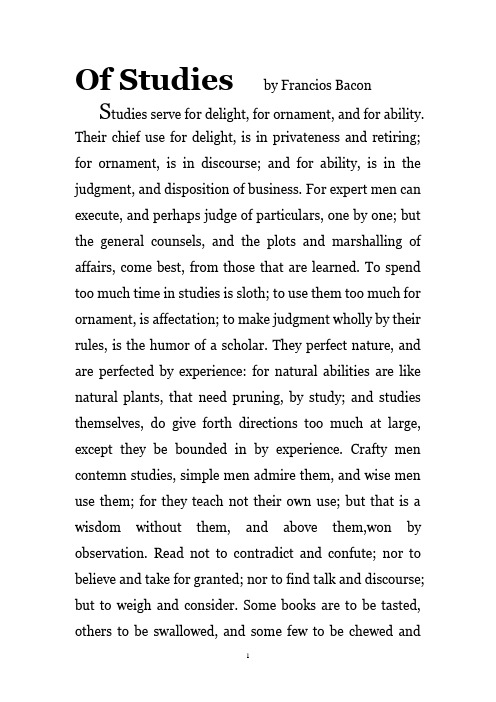
Of Studies by Francios BaconS tudies serve for delight, for ornament, and for ability. Their chief use for delight, is in privateness and retiring; for ornament, is in discourse; and for ability, is in the judgment, and disposition of business. For expert men can execute, and perhaps judge of particulars, one by one; but the general counsels, and the plots and marshalling of affairs, come best, from those that are learned. To spend too much time in studies is sloth; to use them too much for ornament, is affectation; to make judgment wholly by their rules, is the humor of a scholar. They perfect nature, and are perfected by experience: for natural abilities are like natural plants, that need pruning, by study; and studies themselves, do give forth directions too much at large, except they be bounded in by experience. Crafty men contemn studies, simple men admire them, and wise men use them; for they teach not their own use; but that is a wisdom without them, and above them,won by observation. Read not to contradict and confute; nor to believe and take for granted; nor to find talk and discourse; but to weigh and consider. Some books are to be tasted, others to be swallowed, and some few to be chewed anddigested; that is, some books are to be read only in parts; others to be read, but not curiously; and some few to be read wholly, and with diligence and attention. Some books also may be read by deputy, and extracts made of them by others; but that would be only in the less important arguments, and the meaner sort of books, else distilled books are like common distilled waters, flashy things.Reading make a full man; conference a ready man; and writing an exact man. And therefore, if a man write little, he had need have a great memory; if he confer little, he had need have a present wit; and if he read little, he had need have much cunning, to seem to know, that he does not. Histories make men wise; poets witty; the mathematics subtitle; natural philosophy deep; moral grave; logic and rhetoric able to contend.谈读书读书足以怡情,足以博彩,足以长才。
培根-论读书
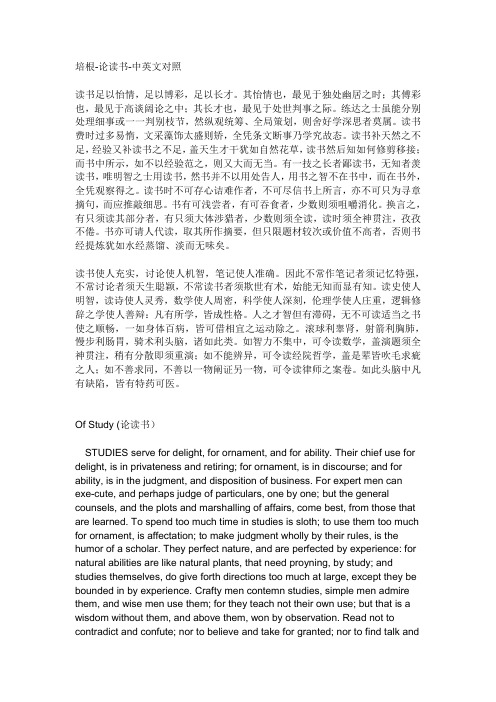
培根-论读书-中英文对照读书足以怡情,足以博彩,足以长才。
其怡情也,最见于独处幽居之时;其傅彩也,最见于高谈阔论之中;其长才也,最见于处世判事之际。
练达之士虽能分别处理细事或一一判别枝节,然纵观统筹、全局策划,则舍好学深思者莫属。
读书费时过多易惰,文采藻饰太盛则矫,全凭条文断事乃学究故态。
读书补天然之不足,经验又补读书之不足,盖天生才干犹如自然花草,读书然后知如何修剪移接;而书中所示,如不以经验范之,则又大而无当。
有一技之长者鄙读书,无知者羡读书,唯明智之士用读书,然书并不以用处告人,用书之智不在书中,而在书外,全凭观察得之。
读书时不可存心诘难作者,不可尽信书上所言,亦不可只为寻章摘句,而应推敲细思。
书有可浅尝者,有可吞食者,少数则须咀嚼消化。
换言之,有只须读其部分者,有只须大体涉猎者,少数则须全读,读时须全神贯注,孜孜不倦。
书亦可请人代读,取其所作摘要,但只限题材较次或价值不高者,否则书经提炼犹如水经蒸馏、淡而无味矣。
读书使人充实,讨论使人机智,笔记使人准确。
因此不常作笔记者须记忆特强,不常讨论者须天生聪颖,不常读书者须欺世有术,始能无知而显有知。
读史使人明智,读诗使人灵秀,数学使人周密,科学使人深刻,伦理学使人庄重,逻辑修辞之学使人善辩:凡有所学,皆成性格。
人之才智但有滞碍,无不可读适当之书使之顺畅,一如身体百病,皆可借相宜之运动除之。
滚球利睾肾,射箭利胸肺,慢步利肠胃,骑术利头脑,诸如此类。
如智力不集中,可令读数学,盖演题须全神贯注,稍有分散即须重演;如不能辨异,可令读经院哲学,盖是辈皆吹毛求疵之人;如不善求同,不善以一物阐证另一物,可令读律师之案卷。
如此头脑中凡有缺陷,皆有特药可医。
Of Study (论读书)STUDIES serve for delight, for ornament, and for ability. Their chief use for delight, is in privateness and retiring; for ornament, is in discourse; and for ability, is in the judgment, and disposition of business. For expert men canexe-cute, and perhaps judge of particulars, one by one; but the general counsels, and the plots and marshalling of affairs, come best, from those that are learned. To spend too much time in studies is sloth; to use them too much for ornament, is affectation; to make judgment wholly by their rules, is the humor of a scholar. They perfect nature, and are perfected by experience: for natural abilities are like natural plants, that need proyning, by study; and studies themselves, do give forth directions too much at large, except they be bounded in by experience. Crafty men contemn studies, simple men admire them, and wise men use them; for they teach not their own use; but that is a wisdom without them, and above them, won by observation. Read not to contradict and confute; nor to believe and take for granted; nor to find talk anddiscourse; but to weigh and consider. Some books are to be tasted, others to be swallowed, and some few to be chewed and digested; that is, some books are to be read only in parts; others to be read, but not curiously; and some few to be read wholly, and with diligence and attention. Some books also may be read by deputy, and extracts made of them bothers; but that would be only in the less important arguments, and the meaner sort of books, else distilled books are like common distilled waters, flashy things.Reading make a full man; conference a ready man; and writing an exact man. And therefore, if a man write little, he had need have a great memory; if he confer little, he had need have a present wit: and if he read little, he had need have much cunning, to seem to know, that he doth not. Histories make men wise; poets witty; the mathematics subtitle; natural philosophy deep; moral grave; logic and rhetoric able to contend. Abeunt studia in mores. Nay, there is no stand or impediment in the wit, but may be wrought out by fit studies; like as diseases of the body, may have appropriate exercises. Bowling is good for the stone and reins; shooting for the lungs and breast; gentle walking for the stomach; riding for the head; and the like. So if a man\'s wit be wandering, let him study the mathematics; for in demonstrations, if his wit be called away never so little, he must begin again. If his wit be not apt to distinguish or find differences, let him study the Schoolmen; for they are cymini sectors. If he be not apt to beat over matters, and to call up one thing to prove and illustrate another, let him study the lawyers\' cases. So every defect of the mind, may have a special receipt.。
培根的《论读书》OfStudies(原文和译文)
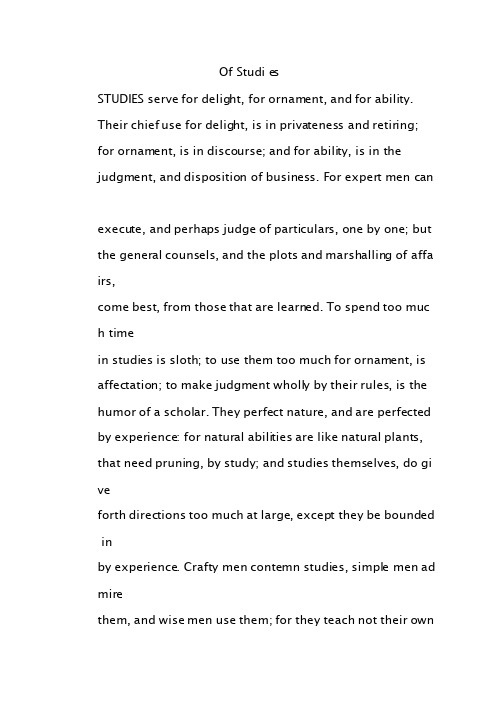
Of Studie sSTUDIE S servefor deligh t, for orname nt, and for abilit y. Theirchiefuse for deligh t, is in privat eness and retiri ng; for orname nt, is in discou rse; and for abilit y, is in the judgme nt, and dispos ition of busine ss. For expert men canexecut e, and perhap s judgeof partic ulars, one by one; but the genera l counse ls, and the plotsand marsha lling of affa ir s,come best, from thosethat are learne d. To spendtoo muc h timein studie s is sloth; to use them too much for orname nt, is affect ation; to make judgme nt wholly by theirrules, is the humorof a schola r. They perfec t nature, and are perfec ted by experi ence: for natura l abilit ies are like natura l plants, that need prunin g, by study; and studie s themse lves, do gi veforthdirect ionstoo much at large, except they be bounde d inby experi ence. Crafty men contem n studie s, simple men ad mirethem, and wise men use them; for they teachnot theirownbut that is a wisdom withou t them, and abovethem, won b yobserv ation. Read not to contra dictand confut e; nor to beli ev eand take for grante d; nor to find talk and discou rse; but to weighand consid er. Some booksare to be tasted, others t o beswallo wed, and some few to be chewed and digest ed; that i s,some booksare to be read only in parts; others to be read,but not curiou sly; and some few to be read wholly, and wit hdilige nce and attent ion. Some booksalso may be read by d eputy,and extrac ts made of them bother s; but that wouldbe only inthe less import ant argume nts, and the meaner sort of book s,else distil led booksare like common distil led waters, flashyReadin g make a full man; confer encea readyman; and writ in gan exactman. And theref ore, if a man writelittle, he had need have a greatmemory; if he confer little, he had need have a presen t wit: and if he read little, he had need have much cunnin g, to seem to know, that he doth not. Histor ie smake men wise; poetswitty; the mathem atics subtit le; nat ura lphilos ophydeep; moralgrave; logicand rhetor ic able to co nten d.Abeunt studia in mores. Nay, thereis no standor impedi m entinthe wit, but may be wrough t out by fit studie s; like as diseasesof the body, may have approp riate exerci ses. Bowlin g is go od forthe stoneand reins; shooti ng for the lungsand ***; gentle walkin g for the stomac h; riding for the head; and the like. Soif a man's wit be wander ing, let him studythe mathem atics ; forin demons trati ons, if his wit be called away neverso little, he must beginagain. If his wit be not apt to distin guish or find differ ences, let him studythe School men; for they are Cymini sector s. If he be not apt to beat over matter s, and tocall up one thingto proveand illust rateanothe r, let him st udythe lawyer s' cases. So everydefect of the mind, may have a specia l receip t.论读书王佐良译读书足以怡情,足以傅彩,足以长才。
弗朗西斯.培根《论读书》Of-Studies(译文对比)
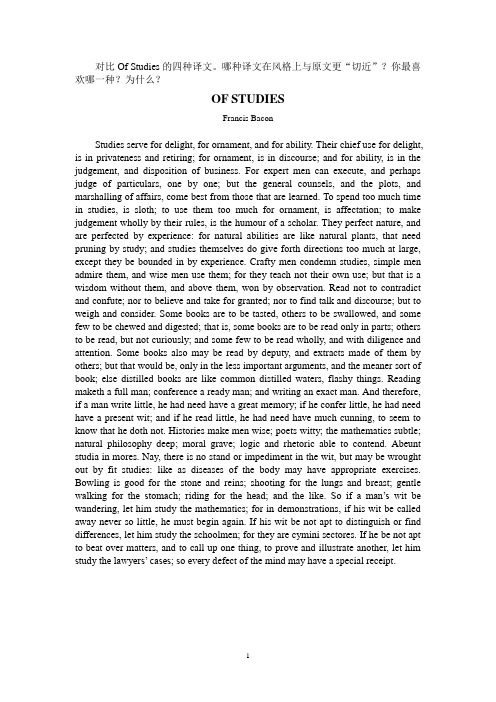
对比Of Studies的四种译文。
哪种译文在风格上与原文更“切近”?你最喜欢哪一种?为什么?OF STUDIESFrancis BaconStudies serve for delight, for ornament, and for ability. Their chief use for delight, is in privateness and retiring; for ornament, is in discourse; and for ability, is in the judgement, and disposition of business. For expert men can execute, and perhaps judge of particulars, one by one; but the general counsels, and the plots, and marshalling of affairs, come best from those that are learned. To spend too much time in studies, is sloth; to use them too much for ornament, is affectation; to make judgement wholly by their rules, is the humour of a scholar. They perfect nature, and are perfected by experience: for natural abilities are like natural plants, that need pruning by study; and studies themselves do give forth directions too much at large, except they be bounded in by experience. Crafty men condemn studies, simple men admire them, and wise men use them; for they teach not their own use; but that is a wisdom without them, and above them, won by observation. Read not to contradict and confute; nor to believe and take for granted; nor to find talk and discourse; but to weigh and consider. Some books are to be tasted, others to be swallowed, and some few to be chewed and digested; that is, some books are to be read only in parts; others to be read, but not curiously; and some few to be read wholly, and with diligence and attention. Some books also may be read by deputy, and extracts made of them by others; but that would be, only in the less important arguments, and the meaner sort of book; else distilled books are like common distilled waters, flashy things. Reading maketh a full man; conference a ready man; and writing an exact man. And therefore, if a man write little, he had need have a great memory; if he confer little, he had need have a present wit; and if he read little, he had need have much cunning, to seem to know that he doth not. Histories make men wise; poets witty; the mathematics subtle; natural philosophy deep; moral grave; logic and rhetoric able to contend. Abeunt studia in mores. Nay, there is no stand or impediment in the wit, but may be wrought out by fit studies: like as diseases of the body may have appropriate exercises. Bowling is good for the stone and reins; shooting for the lungs and breast; gentle walking for the stomach; riding for the head; and the like. So if a man’s wit be wandering, let him study the mathematics; for in demonstrations, if his wit be called away never so little, he must begin again. If his wit be not apt to distinguish or find differences, let him study the schoolmen; for they are cymini sectores. If he be not apt to beat over matters, and to call up one thing, to prove and illustrate another, let him study the lawyers’ cases; so every d efect of the mind may have a special receipt.谈读书(译文1)读书可以怡情养性,可以摭拾文采,可以增长才干。
Of studies原文译文及赏析
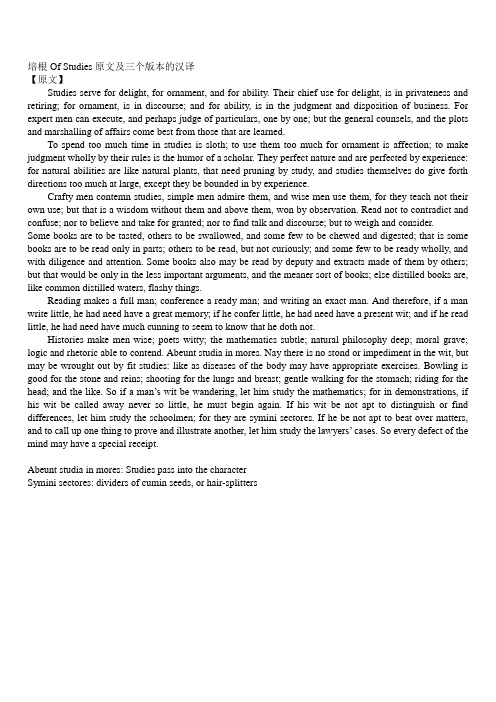
培根Of Studies原文及三个版本的汉译【原文】Studies serve for delight, for ornament, and for ability. Their chief use for delight, is in privateness and retiring; for ornament, is in discourse; and for ability, is in the judgment and disposition of business. For expert men can execute, and perhaps judge of particulars, one by one; but the general counsels, and the plots and marshalling of affairs come best from those that are learned.To spend too much time in studies is sloth; to use them too much for ornament is affection; to make judgment wholly by their rules is the humor of a scholar. They perfect nature and are perfected by experience: for natural abilities are like natural plants, that need pruning by study, and studies themselves do give forth directions too much at large, except they be bounded in by experience.Crafty men contemn studies, simple men admire them, and wise men use them, for they teach not their own use; but that is a wisdom without them and above them, won by observation. Read not to contradict and confuse; nor to believe and take for granted; nor to find talk and discourse; but to weigh and consider.Some books are to be tasted, others to be swallowed, and some few to be chewed and digested; that is some books are to be read only in parts; others to be read, but not curiously; and some few to be ready wholly, and with diligence and attention. Some books also may be read by deputy and extracts made of them by others; but that would be only in the less important arguments, and the meaner sort of books; else distilled books are, like common distilled waters, flashy things.Reading makes a full man; conference a ready man; and writing an exact man. And therefore, if a man write little, he had need have a great memory; if he confer little, he had need have a present wit; and if he read little, he had need have much cunning to seem to know that he doth not.Histories make men wise; poets witty; the mathematics subtle; natural philosophy deep; moral grave; logic and rhetoric able to contend. Abeunt studia in mores. Nay there is no stond or impediment in the wit, but may be wrought out by fit studies: like as diseases of the body may have appropriate exercises. Bowling is good for the stone and reins; shooting for the lungs and breast; gentle walking for the stomach; riding for the head; and the like. So if a man’s wit be wandering, let him study the mathematics; for in demonstrations, if his wit be called away never so little, he must begin again. If his wit be not apt to distinguish or find differences, let him study the schoolmen; for they are symini sectores. If he be not apt to beat over matters, and to call up one thing to prove and illustrate another, let him study the lawyers’ cases. So every defect of the mind may have a special receipt.Abeunt studia in mores: Studies pass into the characterSymini sectores: dividers of cumin seeds, or hair-splitters【译文】一、王佐良译:谈读书读书足以怡情, 足以傅彩, 足以长才。
(完整版)培根的《论读书》OfStudies(原文和译文)
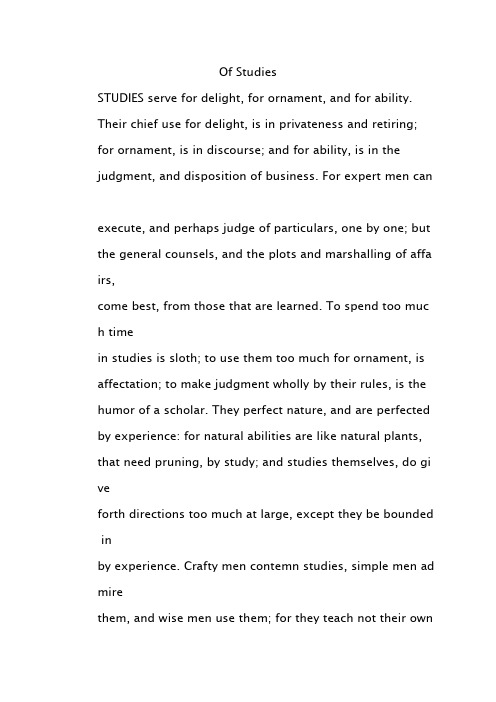
Of StudiesSTUDIES serve for delight, for ornament, and for ability. Their chief use for delight, is in privateness and retiring; for ornament, is in discourse; and for ability, is in the judgment, and disposition of business. For expert men canexecute, and perhaps judge of particulars, one by one; but the general counsels, and the plots and marshalling of affa irs,come best, from those that are learned. To spend too muc h timein studies is sloth; to use them too much for ornament, is affectation; to make judgment wholly by their rules, is the humor of a scholar. They perfect nature, and are perfected by experience: for natural abilities are like natural plants, that need pruning, by study; and studies themselves, do gi veforth directions too much at large, except they be bounded inby experience. Crafty men contemn studies, simple men ad mirethem, and wise men use them; for they teach not their ownbut that is a wisdom without them, and above them, won b yobservation. Read not to contradict and confute; nor to beli eveand take for granted; nor to find talk and discourse; but to weigh and consider. Some books are to be tasted, others t o beswallowed, and some few to be chewed and digested; that i s,some books are to be read only in parts; others to be read,but not curiously; and some few to be read wholly, and wit hdiligence and attention. Some books also may be read by d eputy,and extracts made of them bothers; but that would be only inthe less important arguments, and the meaner sort of book s,else distilled books are like common distilled waters, flashyReading make a full man; conference a ready man; and writ ingan exact man. And therefore, if a man write little, he had need have a great memory; if he confer little, he had need have a present wit: and if he read little, he had need have much cunning, to seem to know, that he doth not. Historie smake men wise; poets witty; the mathematics subtitle; nat uralphilosophy deep; moral grave; logic and rhetoric able to co ntend.Abeunt studia in mores. Nay, there is no stand or impedim ent inthe wit, but may be wrought out by fit studies; like as disea sesof the body, may have appropriate exercises. Bowling is go od forthe stone and reins; shooting for the lungs and ***; gentle walking for the stomach; riding for the head; and the like. Soif a man's wit be wandering, let him study the mathematics ; forin demonstrations, if his wit be called away never so little, he must begin again. If his wit be not apt to distinguish or find differences, let him study the Schoolmen; for they are Cymini sectors. If he be not apt to beat over matters, and t ocall up one thing to prove and illustrate another, let him st udythe lawyers' cases. So every defect of the mind, may have a special receipt.论读书王佐良译读书足以怡情,足以傅彩,足以长才。
培根的论读书及翻译
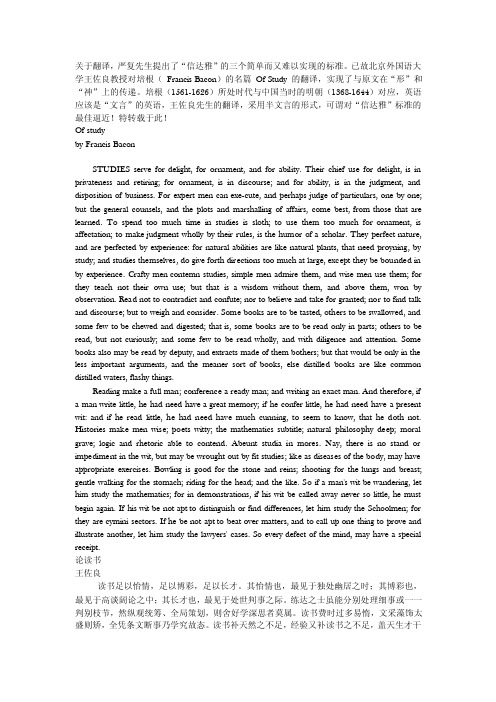
关于翻译,严复先生提出了“信达雅”的三个简单而又难以实现的标准。
已故北京外国语大学王佐良教授对培根(Francis Bacon)的名篇Of Study 的翻译,实现了与原文在“形”和“神”上的传递。
培根(1561-1626)所处时代与中国当时的明朝(1368-1644)对应,英语应该是“文言”的英语,王佐良先生的翻译,采用半文言的形式,可谓对“信达雅”标准的最佳逼近!特转载于此!Of studyby Francis BaconSTUDIES serve for delight, for ornament, and for ability. Their chief use for delight, is in privateness and retiring; for ornament, is in discourse; and for ability, is in the judgment, and disposition of business. For expert men can exe-cute, and perhaps judge of particulars, one by one; but the general counsels, and the plots and marshalling of affairs, come best, from those that are learned. To spend too much time in studies is sloth; to use them too much for ornament, is affectation; to make judgment wholly by their rules, is the humor of a scholar. They perfect nature, and are perfected by experience: for natural abilities are like natural plants, that need proyning, by study; and studies themselves, do give forth directions too much at large, except they be bounded in by experience. Crafty men contemn studies, simple men admire them, and wise men use them; for they teach not their own use; but that is a wisdom without them, and above them, won by observation. Read not to contradict and confute; nor to believe and take for granted; nor to find talk and discourse; but to weigh and consider. Some books are to be tasted, others to be swallowed, and some few to be chewed and digested; that is, some books are to be read only in parts; others to be read, but not curiously; and some few to be read wholly, and with diligence and attention. Some books also may be read by deputy, and extracts made of them bothers; but that would be only in the less important arguments, and the meaner sort of books, else distilled books are like common distilled waters, flashy things.Reading make a full man; conference a ready man; and writing an exact man. And therefore, if a man write little, he had need have a great memory; if he confer little, he had need have a present wit: and if he read little, he had need have much cunning, to seem to know, that he doth not. Histories make men wise; poets witty; the mathematics subtitle; natural philosophy deep; moral grave; logic and rhetoric able to contend. Abeunt studia in mores. Nay, there is no stand or impediment in the wit, but may be wrought out by fit studies; like as diseases of the body, may have appropriate exercises. Bowling is good for the stone and reins; shooting for the lungs and breast; gentle walking for the stomach; riding for the head; and the like. So if a man's wit be wandering, let him study the mathematics; for in demonstrations, if his wit be called away never so little, he must begin again. If his wit be not apt to distinguish or find differences, let him study the Schoolmen; for they are cymini sectors. If he be not apt to beat over matters, and to call up one thing to prove and illustrate another, let him study the lawyers' cases. So every defect of the mind, may have a special receipt.论读书王佐良读书足以怡情,足以博彩,足以长才。
论学习-弗兰西斯·培根(三个译本)
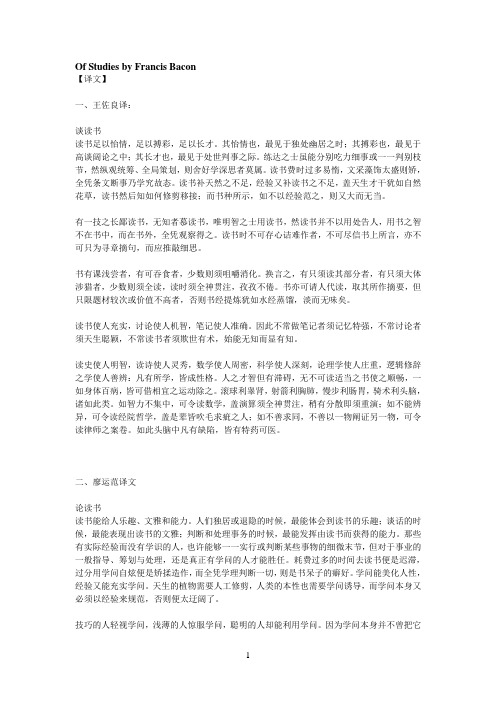
Of Studies by Francis Bacon【译文】一、王佐良译:谈读书读书足以怡情,足以搏彩,足以长才。
其怡情也,最见于独处幽居之时;其搏彩也,最见于高谈阔论之中;其长才也,最见于处世判事之际。
练达之士虽能分别吃力细事或一一判别枝节,然纵观统筹、全局策划,则舍好学深思者莫属。
读书费时过多易惰,文采藻饰太盛则矫,全凭条文断事乃学究故态。
读书补天然之不足,经验又补读书之不足,盖天生才干犹如自然花草,读书然后知如何修剪移接;而书种所示,如不以经验范之,则又大而无当。
有一技之长鄙读书,无知者慕读书,唯明智之士用读书,然读书并不以用处告人,用书之智不在书中,而在书外,全凭观察得之。
读书时不可存心诘难作者,不可尽信书上所言,亦不可只为寻章摘句,而应推敲细思。
书有课浅尝者,有可吞食者,少数则须咀嚼消化。
换言之,有只须读其部分者,有只须大体涉猎者,少数则须全读,读时须全神贯注,孜孜不倦。
书亦可请人代读,取其所作摘要,但只限题材较次或价值不高者,否则书经提炼犹如水经蒸馏,淡而无味矣。
读书使人充实,讨论使人机智,笔记使人准确。
因此不常做笔记者须记忆特强,不常讨论者须天生聪颖,不常读书者须欺世有术,始能无知而显有知。
读史使人明智,读诗使人灵秀,数学使人周密,科学使人深刻,论理学使人庄重,逻辑修辞之学使人善辨:凡有所学,皆成性格。
人之才智但有滞碍,无不可读适当之书使之顺畅,一如身体百病,皆可借相宜之运动除之。
滚球利睾肾,射箭利胸肺,慢步利肠胃,骑术利头脑,诸如此类。
如智力不集中,可令读数学,盖演算须全神贯注,稍有分散即须重演;如不能辨异,可令读经院哲学,盖是辈皆吹毛求疵之人;如不善求同,不善以一物阐证另一物,可令读律师之案卷。
如此头脑中凡有缺陷,皆有特药可医。
二、廖运范译文论读书读书能给人乐趣、文雅和能力。
人们独居或退隐的时候,最能体会到读书的乐趣;谈话的时候,最能表现出读书的文雅;判断和处理事务的时候,最能发挥由读书而获得的能力。
培根《论读书》译文

培根《论读书》译文of study (论读书)STUDIES serve for delight, for ornament, and for ability. Their chief use for delight, is in privateness and retiring; for ornament, is in discourse; and for ability, is in the judgment, and disposition of business. For expert men can exe-cute, and perhaps judge of particulars, one by one; but the general counsels, and the plots and marshalling of affairs, come best, from those that are learned. To spend too much time in studies is sloth; to use them too much for ornament, is affectation; to make judgment wholly by their rules, is the humor of a scholar. They perfect nature, and are perfected by experience: for natural abilities are like natural plants, that need proyning, by study; and studies themselves, do give forth directions too much at large, except they be bounded in by experience. Crafty men contemn studies, simple men admire them, and wise men use them; for they teach not their own use; but that is a wisdom without them, and above them, won by observation. Read not to contradict and confute; nor to believe and take for granted; nor to find talk and discourse; but to weigh and consider. Some books are to be tasted, others to beswallowed, and some few to be chewed and digested; that is, some books are to be read only in parts; others to be read, but not curiously; and some few to be read wholly, and with diligence and attention. Some books also may be read by deputy, and extracts made of them bothers; but that would be only in the less important arguments, and the meaner sort of books, else distilled books are like common distilled waters, flashy things.Reading make a full man; conference a ready man; and writing an exact man. And therefore, if a man write little, he had need have a great memory; if he confer little, he had need have a present wit: and if he read little, he had need have much cunning, to seem to know, that he doth not. Histories make men wise; poets witty; the mathematics subtitle; natural philosophy deep; moral grave; logic and rhetoric able to contend. Abeunt studia in mores. Nay, there is no stand or impediment in the wit, but may be wrought out by fit studies; like as diseases of the body, may have appropriate exercises. Bowling is good for the stone and reins; shooting for the lungs and breast; gentle walking for the stomach; riding for the head; and the like. So if a man\'s wit be wandering, let him study the mathematics; for in demonstrations, if his wit be called away never so little, hemust begin again. If his wit be not apt to distinguish or find differences, let him study the Schoolmen; for they are cymini sectors. If he be not apt to beat over matters, and to call up one thing to prove and illustrate another, let him study the lawyers\' cases. So every defect of the mind, may have a special receipt.译文:读书足以怡情,足以博彩,足以长才。
独创逐句中英对照阅读培根的《论学习》Of Studies

Of StudiesFrancis Bacon论学习(王佐良先生译)STUDIES serve for delight, for ornament, and for ability.读书足以怡情,足以博彩,足以长才。
Their chief use for delight, is in privateness and retiring;其怡情也,最见于独处幽居之时;for ornament, is in discourse;其傅彩也,最见于高谈阔论之中;and for ability, is in the judgment, and disposition of business.其长才也,最见于处世判事之际。
For expert men can execute, and perhaps judge of particulars, one by one; 练达之士虽能分别处理细事或一一判别枝节,but the general counsels, and the plots and marshalling of affairs, come best, from those that are learned.然纵观统筹、全局策划,则舍好学深思者莫属。
To spend too much time in studies is sloth;读书费时过多易惰,to use them too much for ornament, is affectation;文采藻饰太盛则矫,to make judgment wholly by their rules, is the humor of a scholar.全凭条文断事乃学究故态。
They perfect nature, and are perfected by experience: 读书补天然之不足,经验又补读书之不足,for natural abilities are like natural plants, that need proyning, by study; 盖天生才干犹如自然花草,读书然后知如何修剪移接;and studies themselves, do give forth directions too much at large, except they be bounded in by experience.而书中所示,如不以经验范之,则又大而无当。
培根美文《论读书》原文及三种译文鉴赏
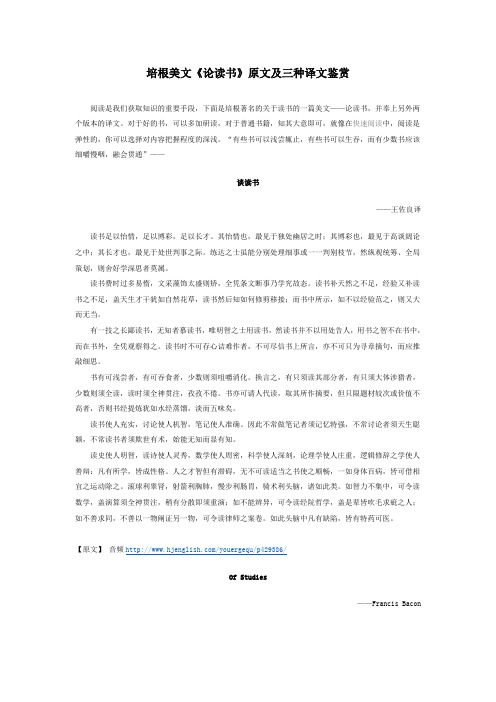
培根美文《论读书》原文及三种译文鉴赏阅读是我们获取知识的重要手段,下面是培根著名的关于读书的一篇美文——论读书,并奉上另外两个版本的译文。
对于好的书,可以多加研读,对于普通书籍,知其大意即可,就像在快速阅读中,阅读是弹性的,你可以选择对内容把握程度的深浅。
“有些书可以浅尝辄止,有些书可以生吞,而有少数书应该细嚼慢咽,融会贯通”——谈读书——王佐良译读书足以怡情,足以博彩,足以长才。
其怡情也,最见于独处幽居之时;其博彩也,最见于高谈阔论之中;其长才也,最见于处世判事之际。
练达之士虽能分别处理细事或一一判别枝节,然纵观统筹、全局策划,则舍好学深思者莫属。
读书费时过多易惰,文采藻饰太盛则矫,全凭条文断事乃学究故态。
读书补天然之不足,经验又补读书之不足,盖天生才干犹如自然花草,读书然后知如何修剪移接;而书中所示,如不以经验范之,则又大而无当。
有一技之长鄙读书,无知者慕读书,唯明智之士用读书,然读书并不以用处告人,用书之智不在书中,而在书外,全凭观察得之。
读书时不可存心诘难作者,不可尽信书上所言,亦不可只为寻章摘句,而应推敲细思。
书有可浅尝者,有可吞食者,少数则须咀嚼消化。
换言之,有只须读其部分者,有只须大体涉猎者,少数则须全读,读时须全神贯注,孜孜不倦。
书亦可请人代读,取其所作摘要,但只限题材较次或价值不高者,否则书经提炼犹如水经蒸馏,淡而五味矣。
读书使人充实,讨论使人机智,笔记使人准确。
因此不常做笔记者须记忆特强,不常讨论者须天生聪颖,不常读书者须欺世有术,始能无知而显有知。
读史使人明智,读诗使人灵秀,数学使人周密,科学使人深刻,论理学使人庄重,逻辑修辞之学使人善辩:凡有所学,皆成性格。
人之才智但有滞碍,无不可读适当之书使之顺畅,一如身体百病,皆可借相宜之运动除之。
滚球利睾肾,射箭利胸肺,慢步利肠胃,骑术利头脑,诸如此类。
如智力不集中,可令读数学,盖演算须全神贯注,稍有分散即须重演;如不能辨异,可令读经院哲学,盖是辈皆吹毛求疵之人;如不善求同,不善以一物阐证另一物,可令读律师之案卷。
培根美文论读书原文及三种译文鉴赏

培根美文论读书原文及三种译文鉴赏文件管理序列号:[K8UY-K9IO69-O6M243-OL889-F88688]培根美文《论读书》原文及三种译文鉴赏阅读是我们获取知识的重要手段,下面是培根着名的关于读书的一篇美文——论读书,并奉上另外两个版本的译文。
对于好的书,可以多加研读,对于普通书籍,知其大意即可,就像在中,阅读是弹性的,你可以选择对内容把握程度的深浅。
“有些书可以浅尝辄止,有些书可以生吞,而有少数书应该细嚼慢咽,融会贯通”——谈读书——王佐良译读书足以怡情,足以博彩,足以长才。
其怡情也,最见于独处幽居之时;其博彩也,最见于高谈阔论之中;其长才也,最见于处世判事之际。
练达之士虽能分别处理细事或一一判别枝节,然纵观统筹、全局策划,则舍好学深思者莫属。
读书费时过多易惰,文采藻饰太盛则矫,全凭条文断事乃学究故态。
读书补天然之不足,经验又补读书之不足,盖天生才干犹如自然花草,读书然后知如何修剪移接;而书中所示,如不以经验范之,则又大而无当。
有一技之长鄙读书,无知者慕读书,唯明智之士用读书,然读书并不以用处告人,用书之智不在书中,而在书外,全凭观察得之。
读书时不可存心诘难作者,不可尽信书上所言,亦不可只为寻章摘句,而应推敲细思。
书有可浅尝者,有可吞食者,少数则须咀嚼消化。
换言之,有只须读其部分者,有只须大体涉猎者,少数则须全读,读时须全神贯注,孜孜不倦。
书亦可请人代读,取其所作摘要,但只限题材较次或价值不高者,否则书经提炼犹如水经蒸馏,淡而五味矣。
读书使人充实,讨论使人机智,笔记使人准确。
因此不常做笔记者须记忆特强,不常讨论者须天生聪颖,不常读书者须欺世有术,始能无知而显有知。
读史使人明智,读诗使人灵秀,数学使人周密,科学使人深刻,论理学使人庄重,逻辑修辞之学使人善辩:凡有所学,皆成性格。
人之才智但有滞碍,无不可读适当之书使之顺畅,一如身体百病,皆可借相宜之运动除之。
滚球利睾肾,射箭利胸肺,慢步利肠胃,骑术利头脑,诸如此类。
论读书培根英语原文
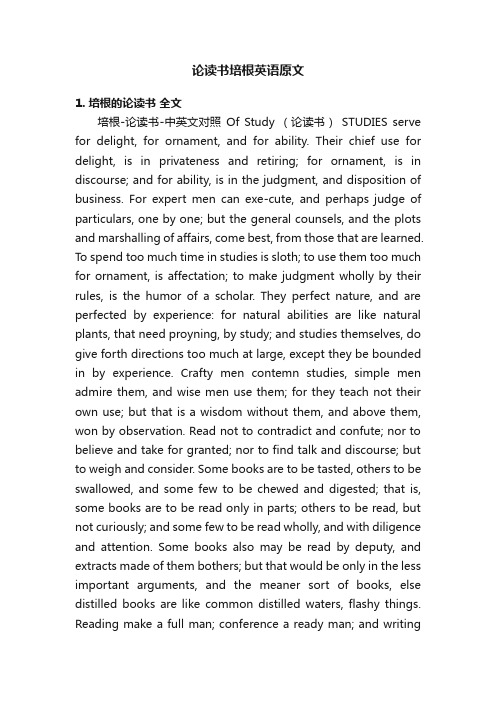
论读书培根英语原文1. 培根的论读书全文培根-论读书-中英文对照Of Study (论读书)STUDIES serve for delight, for ornament, and for ability. Their chief use for delight, is in privateness and retiring; for ornament, is in discourse; and for ability, is in the judgment, and disposition of business. For expert men can exe-cute, and perhaps judge of particulars, one by one; but the general counsels, and the plots and marshalling of affairs, come best, from those that are learned. To spend too much time in studies is sloth; to use them too much for ornament, is affectation; to make judgment wholly by their rules, is the humor of a scholar. They perfect nature, and are perfected by experience: for natural abilities are like natural plants, that need proyning, by study; and studies themselves, do give forth directions too much at large, except they be bounded in by experience. Crafty men contemn studies, simple men admire them, and wise men use them; for they teach not their own use; but that is a wisdom without them, and above them, won by observation. Read not to contradict and confute; nor to believe and take for granted; nor to find talk and discourse; but to weigh and consider. Some books are to be tasted, others to be swallowed, and some few to be chewed and digested; that is, some books are to be read only in parts; others to be read, but not curiously; and some few to be read wholly, and with diligence and attention. Some books also may be read by deputy, and extracts made of them bothers; but that would be only in the less important arguments, and the meaner sort of books, else distilled books are like common distilled waters, flashy things. Reading make a full man; conference a ready man; and writingan exact man. And therefore, if a man write little, he had need have a great memory; if he confer little, he had need have a present wit: and if he read little, he had need have much cunning, to seem to know, that he doth not. Histories make men wise; poets witty; the mathematics subtitle; natural philosophy deep; moral grave; logic and rhetoric able to contend. Abeunt studia in mores. Nay, there is no stand or impediment in the wit, but may be wrought out by fit studies; like as diseases of the body, may have appropriate exercises. Bowling is good for the stone and reins; shooting for the lungs and breast; gentle walking for the stomach; riding for the head; and the like. So if a man\'s wit be wandering, let him study the mathematics; for in demonstrations, if his wit be called away never so little, he must begin again. If his wit be not apt to distinguish or find differences, let him study the Schoolmen; for they are cymini sectors. If he be not apt to beat over matters, and to call up one thing to prove and illustrate another, let him study the lawyers\' cases. So every defect of the mind, may have a special receipt. 读书足以怡情,足以博彩,足以长才。
培根美文论读书原文及三种译文鉴赏
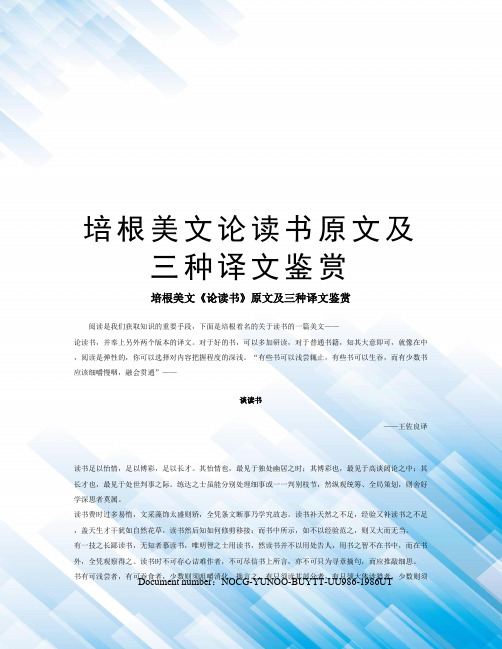
培根美文论读书原文及三种译文鉴赏培根美文《论读书》原文及三种译文鉴赏阅读是我们获取知识的重要手段,下面是培根着名的关于读书的一篇美文——论读书,并奉上另外两个版本的译文。
对于好的书,可以多加研读,对于普通书籍,知其大意即可,就像在中,阅读是弹性的,你可以选择对内容把握程度的深浅。
“有些书可以浅尝辄止,有些书可以生吞,而有少数书应该细嚼慢咽,融会贯通”——谈读书——王佐良译读书足以怡情,足以博彩,足以长才。
其怡情也,最见于独处幽居之时;其博彩也,最见于高谈阔论之中;其长才也,最见于处世判事之际。
练达之士虽能分别处理细事或一一判别枝节,然纵观统筹、全局策划,则舍好学深思者莫属。
读书费时过多易惰,文采藻饰太盛则矫,全凭条文断事乃学究故态。
读书补天然之不足,经验又补读书之不足,盖天生才干犹如自然花草,读书然后知如何修剪移接;而书中所示,如不以经验范之,则又大而无当。
有一技之长鄙读书,无知者慕读书,唯明智之士用读书,然读书并不以用处告人,用书之智不在书中,而在书外,全凭观察得之。
读书时不可存心诘难作者,不可尽信书上所言,亦不可只为寻章摘句,而应推敲细思。
书有可浅尝者,有可吞食者,少数则须咀嚼消化。
换言之,有只须读其部分者,有只须大体涉猎者,少数则须 Document number:NOCG-YUNOO-BUYTT-UU986-1986UT全读,读时须全神贯注,孜孜不倦。
书亦可请人代读,取其所作摘要,但只限题材较次或价值不高者,否则书经提炼犹如水经蒸馏,淡而五味矣。
读书使人充实,讨论使人机智,笔记使人准确。
因此不常做笔记者须记忆特强,不常讨论者须天生聪颖,不常读书者须欺世有术,始能无知而显有知。
读史使人明智,读诗使人灵秀,数学使人周密,科学使人深刻,论理学使人庄重,逻辑修辞之学使人善辩:凡有所学,皆成性格。
人之才智但有滞碍,无不可读适当之书使之顺畅,一如身体百病,皆可借相宜之运动除之。
滚球利睾肾,射箭利胸肺,慢步利肠胃,骑术利头脑,诸如此类。
培根美文集Of Studies英文带翻译整理
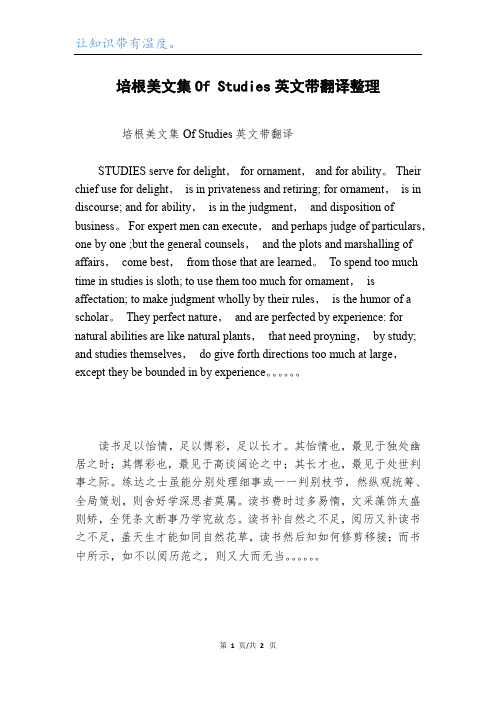
让知识带有温度。
培根美文集Of Studies英文带翻译整理培根美文集Of Studies英文带翻译STUDIES serve for delight,for ornament,and for ability。
Their chief use for delight,is in privateness and retiring; for ornament,is in discourse; and for ability,is in the judgment,and disposition of business。
For expert men can execute,and perhaps judge of particulars,one by one ;but the general counsels,and the plots and marshalling of affairs,come best,from those that are learned。
To spend too much time in studies is sloth; to use them too much for ornament,is affectation; to make judgment wholly by their rules,is the humor of a scholar。
They perfect nature,and are perfected by experience: for natural abilities are like natural plants,that need proyning,by study; and studies themselves,do give forth directions too much at large,except they be bounded in by experience。
Of Study培根论读书原文+翻译
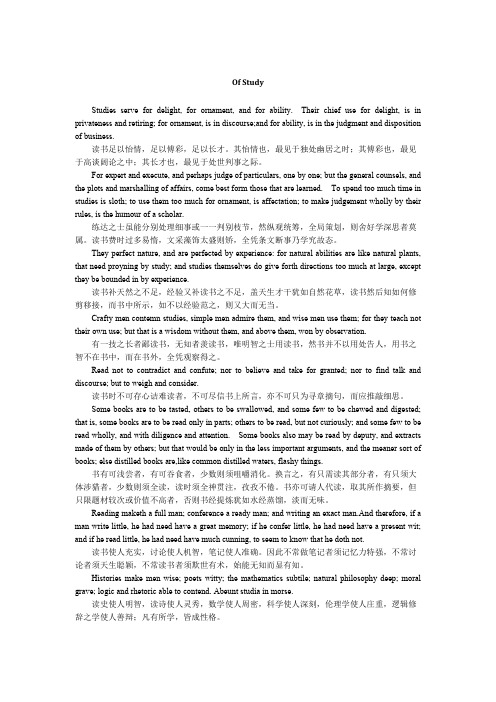
Of StudyStudies serve for delight, for ornament, and for ability. Their chief use for delight, is in privateness and retiring; for ornament, is in discourse;and for ability, is in the judgment and disposition of business.读书足以怡情,足以傅彩,足以长才。
其怡情也,最见于独处幽居之时;其傅彩也,最见于高谈阔论之中;其长才也,最见于处世判事之际。
For expert and execute, and perhaps judge of particulars, one by one; but the general counsels, and the plots and marshalling of affairs, come best form those that are learned. To spend too much time in studies is sloth; to use them too much for ornament, is affectation; to make judgement wholly by their rules, is the humour of a scholar.练达之士虽能分别处理细事或一一判别枝节,然纵观统筹,全局策划,则舍好学深思者莫属。
读书费时过多易惰,文采藻饰太盛则矫,全凭条文断事乃学究故态。
They perfect nature, and are perfected by experience: for natural abilities are like natural plants, that need proyning by study; and studies themselves do give forth directions too much at large, except they be bounded in by experience.读书补天然之不足,经验又补读书之不足,盖天生才干犹如自然花草,读书然后知如何修剪移接,而书中所示,如不以经验范之,则又大而无当。
培根美文论读书原文及三种译文鉴赏
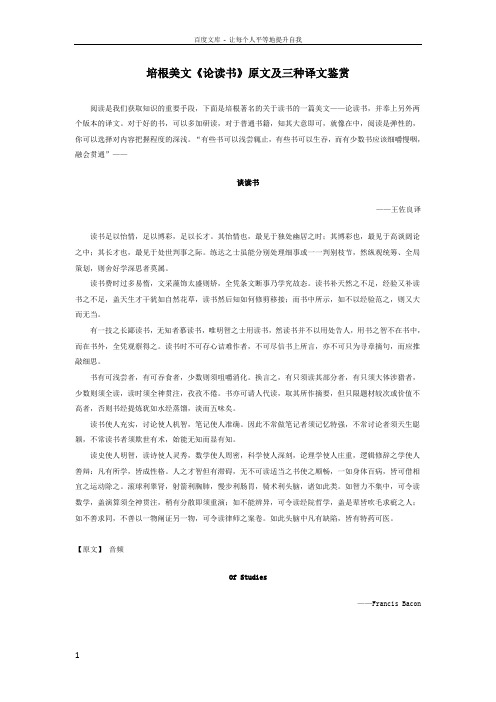
培根美文《论读书》原文及三种译文鉴赏阅读是我们获取知识的重要手段,下面是培根著名的关于读书的一篇美文——论读书,并奉上另外两个版本的译文。
对于好的书,可以多加研读,对于普通书籍,知其大意即可,就像在中,阅读是弹性的,你可以选择对内容把握程度的深浅。
“有些书可以浅尝辄止,有些书可以生吞,而有少数书应该细嚼慢咽,融会贯通”——谈读书——王佐良译读书足以怡情,足以博彩,足以长才。
其怡情也,最见于独处幽居之时;其博彩也,最见于高谈阔论之中;其长才也,最见于处世判事之际。
练达之士虽能分别处理细事或一一判别枝节,然纵观统筹、全局策划,则舍好学深思者莫属。
读书费时过多易惰,文采藻饰太盛则矫,全凭条文断事乃学究故态。
读书补天然之不足,经验又补读书之不足,盖天生才干犹如自然花草,读书然后知如何修剪移接;而书中所示,如不以经验范之,则又大而无当。
有一技之长鄙读书,无知者慕读书,唯明智之士用读书,然读书并不以用处告人,用书之智不在书中,而在书外,全凭观察得之。
读书时不可存心诘难作者,不可尽信书上所言,亦不可只为寻章摘句,而应推敲细思。
书有可浅尝者,有可吞食者,少数则须咀嚼消化。
换言之,有只须读其部分者,有只须大体涉猎者,少数则须全读,读时须全神贯注,孜孜不倦。
书亦可请人代读,取其所作摘要,但只限题材较次或价值不高者,否则书经提炼犹如水经蒸馏,淡而五味矣。
读书使人充实,讨论使人机智,笔记使人准确。
因此不常做笔记者须记忆特强,不常讨论者须天生聪颖,不常读书者须欺世有术,始能无知而显有知。
读史使人明智,读诗使人灵秀,数学使人周密,科学使人深刻,论理学使人庄重,逻辑修辞之学使人善辩:凡有所学,皆成性格。
人之才智但有滞碍,无不可读适当之书使之顺畅,一如身体百病,皆可借相宜之运动除之。
滚球利睾肾,射箭利胸肺,慢步利肠胃,骑术利头脑,诸如此类。
如智力不集中,可令读数学,盖演算须全神贯注,稍有分散即须重演;如不能辨异,可令读经院哲学,盖是辈皆吹毛求疵之人;如不善求同,不善以一物阐证另一物,可令读律师之案卷。
培根美文《论读书》原文及三种译文鉴赏
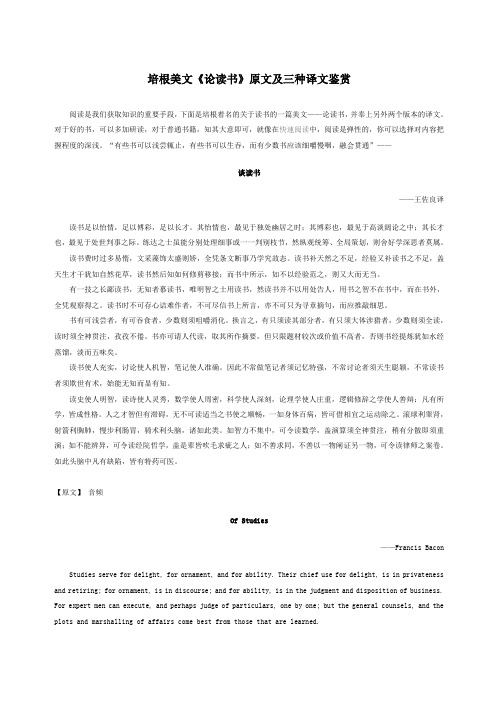
培根美文《论读书》原文及三种译文鉴赏阅读是我们获取知识的重要手段,下面是培根着名的关于读书的一篇美文——论读书,并奉上另外两个版本的译文。
对于好的书,可以多加研读,对于普通书籍,知其大意即可,就像在快速阅读中,阅读是弹性的,你可以选择对内容把握程度的深浅。
“有些书可以浅尝辄止,有些书可以生吞,而有少数书应该细嚼慢咽,融会贯通”——谈读书——王佐良译读书足以怡情,足以博彩,足以长才。
其怡情也,最见于独处幽居之时;其博彩也,最见于高谈阔论之中;其长才也,最见于处世判事之际。
练达之士虽能分别处理细事或一一判别枝节,然纵观统筹、全局策划,则舍好学深思者莫属。
读书费时过多易惰,文采藻饰太盛则矫,全凭条文断事乃学究故态。
读书补天然之不足,经验又补读书之不足,盖天生才干犹如自然花草,读书然后知如何修剪移接;而书中所示,如不以经验范之,则又大而无当。
有一技之长鄙读书,无知者慕读书,唯明智之士用读书,然读书并不以用处告人,用书之智不在书中,而在书外,全凭观察得之。
读书时不可存心诘难作者,不可尽信书上所言,亦不可只为寻章摘句,而应推敲细思。
书有可浅尝者,有可吞食者,少数则须咀嚼消化。
换言之,有只须读其部分者,有只须大体涉猎者,少数则须全读,读时须全神贯注,孜孜不倦。
书亦可请人代读,取其所作摘要,但只限题材较次或价值不高者,否则书经提炼犹如水经蒸馏,淡而五味矣。
读书使人充实,讨论使人机智,笔记使人准确。
因此不常做笔记者须记忆特强,不常讨论者须天生聪颖,不常读书者须欺世有术,始能无知而显有知。
读史使人明智,读诗使人灵秀,数学使人周密,科学使人深刻,论理学使人庄重,逻辑修辞之学使人善辩:凡有所学,皆成性格。
人之才智但有滞碍,无不可读适当之书使之顺畅,一如身体百病,皆可借相宜之运动除之。
滚球利睾肾,射箭利胸肺,慢步利肠胃,骑术利头脑,诸如此类。
如智力不集中,可令读数学,盖演算须全神贯注,稍有分散即须重演;如不能辨异,可令读经院哲学,盖是辈皆吹毛求疵之人;如不善求同,不善以一物阐证另一物,可令读律师之案卷。
- 1、下载文档前请自行甄别文档内容的完整性,平台不提供额外的编辑、内容补充、找答案等附加服务。
- 2、"仅部分预览"的文档,不可在线预览部分如存在完整性等问题,可反馈申请退款(可完整预览的文档不适用该条件!)。
- 3、如文档侵犯您的权益,请联系客服反馈,我们会尽快为您处理(人工客服工作时间:9:00-18:30)。
Studies serve for delight, for ornament, and for ability. Their chief use for delight, is in privateness and retiring; for ornament, is in discourse;and for ability, is in the judgment and disposition of business.
读书足以怡情,足以傅彩,足以长才。
其怡情也,最见于独处幽居之时;其傅彩也,最见于高谈阔论之中;其长才也,最见于处世判事之际。
For expert and execute, and perhaps judge of particulars, one by one; but the general counsels, and the plots and marshalling of affairs, come best form those that are learned. To spend too much time in studies is sloth; to use them too much for ornament, is affectation; to make judgement wholly by their rules, is the humour of a scholar.
练达之士虽能分别处理细事或一一判别枝节,然纵观统筹,全局策划,则舍好学深思者莫属。
读书费时过多易惰,文采藻饰太盛则矫,全凭条文断事乃学究故态。
They perfect nature, and are perfected by experience: for natural abilities are like natural plants, that need proyning by study; and studies themselves do give forth directions too much at large, except they be bounded in by experience.
读书补天然之不足,经验又补读书之不足,盖天生才干犹如自然花草,读书然后知如何修剪移接,而书中所示,如不以经验范之,则又大而无当。
Crafty men contemn studies, simple men admire them, and wise men use them; for they teach not their own use; but that is a wisdom without them, and above them, won by observation.
有一技之长者鄙读书,无知者羡读书,唯明智之士用读书,然书并不以用处告人,用书之智不在书中,而在书外,全凭观察得之。
Read not to contradict and confute; nor to believe and take for granted; nor to find talk and discourse; but to weigh and consider.
读书时不可存心诘难读者,不可尽信书上所言,亦不可只为寻章摘句,而应推敲细思。
Some books are to be tasted, others to be swallowed, and some few to be chewed and digested; that is, some books are to be read only in parts; others to be read, but not curiously; and some few to be read wholly, and with diligence and attention. Some books also may be read by deputy, and extracts made of them by others; but that would be only in the less important arguments, and the meaner sort of books; else distilled books are,like common distilled waters, flashy things.
书有可浅尝者,有可吞食者,少数则须咀嚼消化。
换言之,有只需读其部分者,有只须大体涉猎者,少数则须全读,读时须全神贯注,孜孜不倦。
书亦可请人代读,取其所作摘要,但只限题材较次或价值不高者,否则书经提炼犹如水经蒸馏,淡而无味。
Reading maketh a full man; conference a ready man; and writing an exact therefore, if a man write little, he had need have a great memory; if he confer little, he had need have a present wit; and if he read little, he had need have much cunning, to seem to know that he doth not.
读书使人充实,讨论使人机智,笔记使人准确。
因此不常做笔记者须记忆力特强,不常讨论者须天生聪颖,不常读书者须欺世有术,始能无知而显有知。
Histories make men wise; poets witty; the mathematics subtile; natural philosophy deep; moral grave; logic and rhetoric able to contend. Abeunt studia in morse.
读史使人明智,读诗使人灵秀,数学使人周密,科学使人深刻,伦理学使人庄重,逻辑修辞之学使人善辩;凡有所学,皆成性格。
